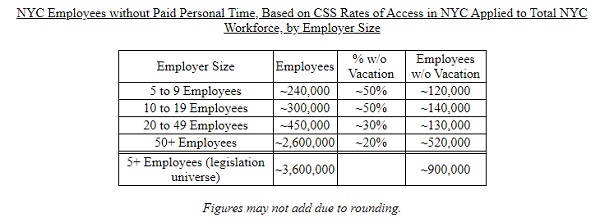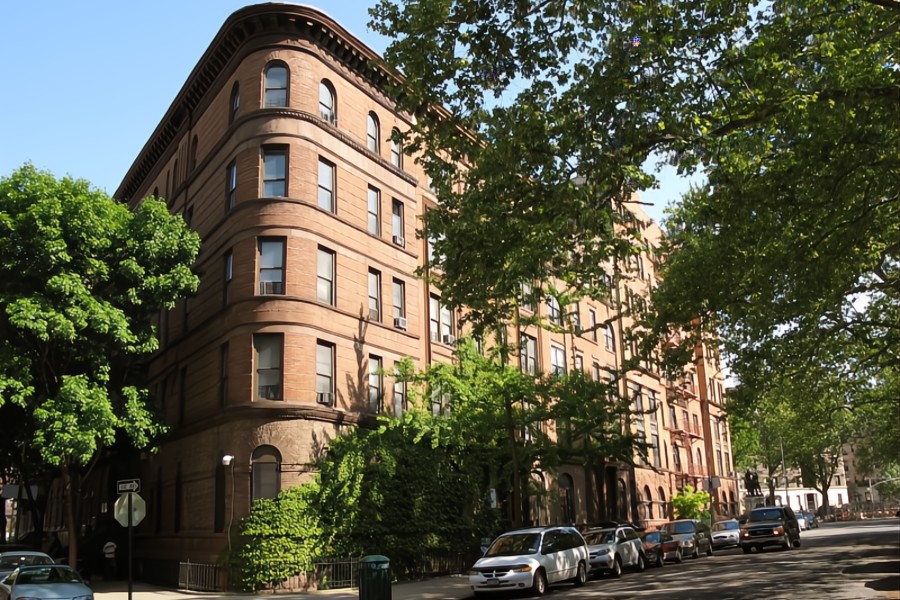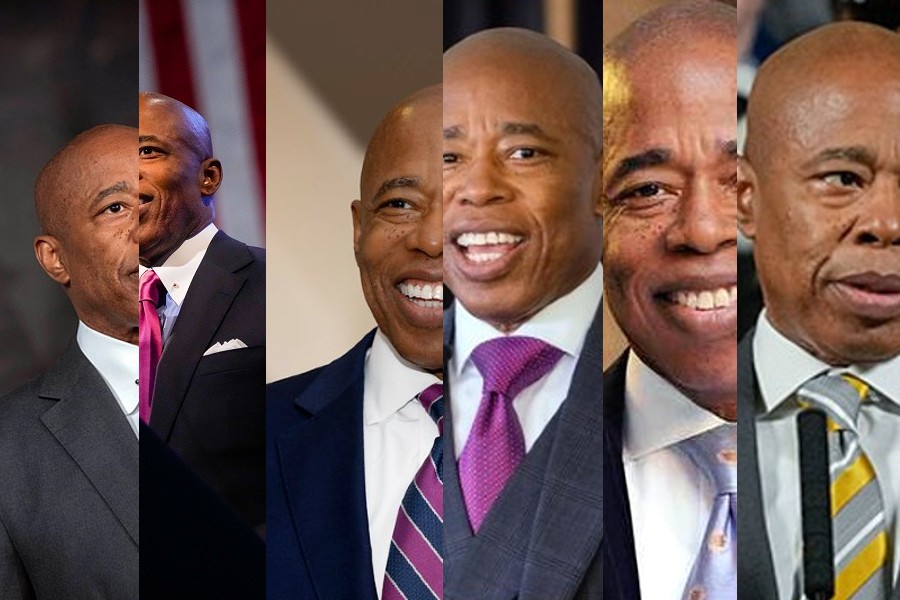 Mayor Bill de Blasio, First Lady Chirlane McCray, Public Advocate Jumaane Williams, activist Gloria Steinem and advocates today rallied in support of Paid Personal Time legislation from Harlem to Hollis. The bill, which is being heard for the first time today, would make New York City the first city in the nation to mandate paid time off for workers. The Mayor made Paid Personal Time a signature piece of his State of the City address this past January. A detailed analysis by the City, conducted since January, now estimates 900,000 New Yorkers who currently lack a single day of paid personal time would benefit from the new policy.
Mayor Bill de Blasio, First Lady Chirlane McCray, Public Advocate Jumaane Williams, activist Gloria Steinem and advocates today rallied in support of Paid Personal Time legislation from Harlem to Hollis. The bill, which is being heard for the first time today, would make New York City the first city in the nation to mandate paid time off for workers. The Mayor made Paid Personal Time a signature piece of his State of the City address this past January. A detailed analysis by the City, conducted since January, now estimates 900,000 New Yorkers who currently lack a single day of paid personal time would benefit from the new policy.
“Working people have been working longer and harder with very little to show for it,” said Mayor de Blasio. “Too many people in this city aren’t guaranteed any time off – not a single day. That means choosing between earning a paycheck and your kid’s dance recital, helping your parent move into a nursing home, or that vacation you’ve been saving for. That’s not what New York City is about. Hardworking New Yorkers deserve more and we’re going to ensure they get it.”
“Too many working New Yorkers – especially women and immigrants – are in an impossible struggle for more time, often having to choose between their paycheck and their well-being,” said First Lady Chirlane McCray. “That injustice ends with paid time off. New York City stands up for working people and we look forward to seeing this legislation become law.”
“When it comes to improving the lives of working people in this country, New York City is leading the way,” said Deputy Mayor for Strategic Policy Initiatives J. Phillip Thompson. “Whether it is spent on a doctor’s visit, PTA meeting, voting, or anything else important in their lives, Paid Personal Time will allow workers to build a better future for their families, not just put food on the table.”
“All workers deserve to live their lives with dignity and respect,” said Department of Consumer and Worker Protection Commissioner Lorelei Salas. “Workers deserve time to rest, spend time with family, or attend important life events without the fear of losing a day’s pay or, worse, their job. Balance between work and personal life is critical to the overall health of New York City’s economy and our ability to thrive. I am excited to be a part of this initiative to fight for the fairness and justice of our city’s workers.”
“It’s clear to me that too often, Americans are overworked and undervalued. The United States is the only advanced economy in the world that doesn’t guarantee some level of paid leave. That’s inexcusable, and it’s time to change. It’s time to give working people a break— it’s time to give them time off. I would like to thank the Administration and Council for engaging in a dialogue on how to get this done for working people,” said Public Advocate Jumaane D. Williams.
See the legislation here.
This legislation requires private employers with five or more employees or one or more domestic workers to offer 10 annual days of Paid Personal Time, allowing employees to take paid time off for any purpose, including religious observances, bereavement and time with family. Research has shown that paid time off helps increase productivity, strengthens families, helps prevent burnout and improves employee retention. The United States is the only industrialized nation that does not mandate any paid time off, including paid holidays. Nationally, one in four full-time, middle-income workers gets no paid time off at all.
The updated estimate of nearly 1 million New Yorkers who would benefit from paid time off incorporates additional New York City-specific data from the Community Service Society’s (CSS) 2018 Unheard Third Survey, which was not yet available when the paid personal time proposal was first announced in January. Incorporating CSS’ most recent data provides a richer and more robust estimate of the uncovered population.
The policy is expected to benefit New Yorkers in a wide range of industries who currently receive no paid personal time, including 180,000 workers in professional services, 90,000 in retail, and 200,000 in the hotel and food service sectors. The City already provides government employees with more than two weeks of Paid Personal Leave per year.
The legislation covers employers with five or more employees – the same universe of businesses covered by the Mayor’s 2014 legislation expanding Paid Safe and Sick Leave. Employees would begin to accrue hours immediately after employment, earning one hour of Paid Personal Time for every 30 hours worked. Employees would be able to access the benefit after 90 days of employment and after working at least 80 hours. Any unused Paid Personal Time could be carried over to the following year for a total maximum of 10 days of Paid Personal Time. Employers could require up to 2 weeks’ notice and have reasonable exceptions for granting leave to prevent too many workers from taking simultaneous leave.
Like the landmark Paid Safe and Sick Leave legislation, this policy would be implemented and enforced by the Department of Consumer and Worker Protection (DCWP).
“I’m always proud to live in the Peoples’ Republic of New York, but today, I’m especially proud because, under the leadership of Mayor Bill de Blasio and Chirlane McCray, New York is becoming the first city in the nation to require employers to provide full-time and part-time workers with 10 days of paid personal time — at the rate of one hour for every thirty hours worked. This will affect a million New Yorkers, most of them women of color and immigrant women in low-wage industries, who have often been forced to choose between their kids’ and their own needs and losing a paycheck,” said Gloria Steinem. “We are behind other nations in forcing this impossible choice between, say, attending a parent-teacher conference or a funeral and losing a job, just as we are also behind in childcare and other areas. But with New York City taking the lead, I have confidence that others will follow.”
“There will be questions we’ll need to work out, but all full-time employees deserve a basic minimum of paid time off,” said Manhattan Borough President Gale A. Brewer. “Too often employment becomes a race to the bottom, where employers feel they can’t do the right thing while still competing. It’s government’s job to step in, establish standards, and stop the downward spiral — with overtime standards, minimum wage laws, safety laws, paid sick days, and now, a minimum of personal days.”
“Paid time off legislation is not merely a recognition of the challenges faced by New Yorkers but also a forward-looking solution to the realities of healthy living, family commitments, along with a stable and consistent workforce. I support this effort and meaningful legislation that puts individual New Yorkers and families first,” said Majority Leader Laurie A. Cumbo.
“For decades labor unions, through collective bargaining with management, won benefits for working people in an environment largely created by business. Through these efforts, a better framework for both the worker and enterprise was created. The legislation being heard in our committee today seeks to build on these efforts and marks a historic moment for working people,” said Council Member I. Daneek Miller, Chair of the Committee on Civil Service and Labor. “I look forward to our hearing today as an opportunity to discuss the impacts of this legislation with the Administration, business owners, workers and members of the public. I thank Public Advocate Williams for introducing this groundbreaking legislation and the de Blasio Administration for its continued advocacy and support of working people.”
“No New Yorker should have to fear losing their job for requesting a day off. By granting paid personal time to New Yorkers, our City is taking a long overdue step to reform a system that leaves vulnerable workers with few choices if they need time off for any reason,” said Council Member Margaret S. Chin. “I am proud to join Mayor De Blasio, Public Advocate Williams and my Council colleagues to support this bill and look forward to partnering on future efforts to create a healthier and more productive workforce that will benefit both employees and employers.”
“Every employee needs and deserves paid time off to be with their loved ones, attend to financial and other important life matters, and care for their mental health. The fact that so many hardworking Americans have no paid leave in 2019 is an absolute travesty. I commend Mayor de Blasio and Public Advocate Williams for pushing forward legislation that will give a large segment of working New Yorkers the peace of mind and sense of personal dignity to which we are all entitled. This was long overdue and should be considered by local governments across the country,” said Council Member Helen Rosenthal, Chair of the Committee on Women and Gender Equity.
“This is an incredible development for the men and women who work hard to keep New York running and to provide for their own families every day. For many low wage workers in particular, paid personal time has been an unobtainable luxury. If they have wanted to take a day off, for any reason, they have been forced to struggle without pay and wonder whether or not their job will be waiting for them when they return,” said Hector Figueroa, president of 32BJ SEIU. “Ten paid days off will create much-needed stability for working families in our city.”
“UNITE HERE Local 100 recognizes the importance of securing paid time off for workers. This legislation will be beneficial to our members and New York City’s workforce. We stand alongside Mayor de Blasio in support of passing 10 annual days of Paid Personal Time,” said Bill Granfield, President UNITE HERE Local 100.
“Mayor de Blasio joined other progressive cities when he provided paid sick leave to thousands of workers who had none. Now, the Mayor will make New York City the leader in the nation by mandating paid time off,” said Beverley Brakeman, Regional Director for the United Auto Workers, Region 9a. “The UAW negotiates labor contracts with great benefits for its members, and paid vacation time is a must for every worker so that they can take a break to enjoy life and come back to work recharged.”
“This paid personal time legislation is a game changer for low wage workers like domestic workers who have always had to make impossible choices between work and caring for themselves or their families. This is precisely the type of working family-centered policy that will be building blocks toward a more hopeful economic future,” said NDWA Executive Director, Ai-jen Poo.
“We at Sapna NYC fully support Paid Personal Time for all full- and part-time workers in New York City. We work heavily with the Bangladeshi immigrant community, many of whom work jobs where they get fewer than 10 paid days off per year, if any at all. Paid time off would improve their health, lower stress, and allow workers time to spend with their loved ones or go visit family in Bangladesh. We believe every worker should be given time off,” said Saba Naseem, Assistant Director at Sapna.
“CSS’s research shows that our city’s low-wage workers are disproportionately impacted by the lack of paid vacation and would benefit the most from the proposed paid personal time law,” said David R. Jones, President and CEO of the Community Service Society of New York. “According to our 2018 Unheard Third survey, only 34 percent of the working poor had paid vacation from their employers compared to 82 percent of moderate to higher income employees. Providing a legal right to paid personal time for our city’s workforce, especially for low-wage workers who can least afford to take time off without pay, is another important step that New York can take towards becoming a more equitable and inclusive city.”
[irp]
“This proposal is an important first step towards bringing the United States in line with other wealthy countries, whose workers have long enjoyed a guarantee of paid vacation days,” said Dean Baker, Co-founder Center for Economic and Policy Research.
“New York City is taking the lead in advancing the US toward the well-established standards for work in other developed countries: the much valued but currently under-provided compensation in the form of earned paid time off,” said Lonnie Golden, Professor of Economics, Penn State Abington. “More time, for the purposes of better balancing commitment to our job with other responsibilities outside of work-family, civic, social and personal connections — will give the city a leg up on recruiting, retaining and rewarding talent, at all levels of jobs, not just select, elite positions. It eventually will defray any short term challenges of adjusting to the new, higher standards for quality of life for all residents.”
[irp]
“As a successful entrepreneur, I know why bosses don’t give their employees paid personal time: because they don’t have to. But if you give all working people full paychecks and free time, they will take their families out to eat, or to the beach, or to the mall—thereby providing businesses with customers and entrepreneurs with new consumer demands to meet. The Earned Safe, Sick and Personal Time Act is a big step towards recognizing that when workers thrive, so does our economy. I commend New York City’s Office of the Mayor for their groundbreaking work on this Act,” said Nick Hanauer, entrepreneur, and venture capitalist.
Become a Harlem Insider!
By submitting this form, you are consenting to receive marketing emails from: . You can revoke your consent to receive emails at any time by using the SafeUnsubscribe® link, found at the bottom of every email. Emails are serviced by Constant Contact









